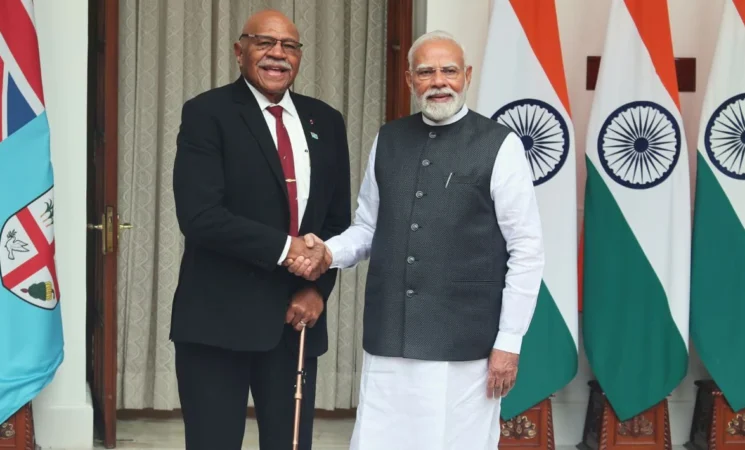30 August 2025, NIICE Commentary 11651
Ritika Suneja
In a significant development, the Prime Minister of the Republic of Fiji, Mr.Sitiveni Rabuka, embarked on an official visit to the Republic of India from 24th to 26th August 2025. Mr. Rabuka, in his three-day visit to India, was accompanied by his spouse, Mrs. Sulueti Rabuka, Minister of Health and Medical Services, Mr. Antonio Lalabalavu, and a delegation of senior officials of the government.
The visit by the Prime Minister of Fiji, first in his current capacity, is a display of symbolic as well as substantial relations shared between the two integral nations of the Indian and Pacific Ocean region, respectively. The countries share a thriving partnership based on mutual respect and strong people-to-people ties, which further fuels other significant avenues of cooperation, such as health, defence, maritime, capacity-building, etc.
To that end, the visit underscored the growing partnership between the countries that witnessed a significant uptick in health collaboration, including the signing of an MoU for design, construction, commissioning, operation, and maintenance of a Super-Specialty Hospital in Fiji, an agreement between M/s. HLL Lifecare Limited, India, and the Ministry of Health and Medical Services, Fiji, on the supply of medicines under the Janaushadhi Scheme, gifting of ambulances to the Fiji Military Forces, setting up of the Jaipur Foot Camp in Fiji, and specialized medical treatment to be offered in India under the Heal in India programme for a certain number of Fijians. Minister of Health and Family Welfare of India, Mr. Jagat Prakash Nadda, called on PM Rabuka, with the latter also visiting the super specialty hospital and Janaushadhi Kendra during the course of the visit.
India has been a hub of health and medical tourism for countries across the globe as it offers a high-end healthcare ecosystem and world-class medical services. The healthcare services in India primarily include assistance in the form of treatment for purposes such as cardiac care, organ transplant, transplantation, orthopedics, neurosciences, oncology, bariatrics, etc., wellness and rejuvenation, including cosmetic surgery, stress relief, spa treatments and alternative medicine care comprising of Ayurveda, Yoga and Naturopathy, Unani, Siddha and Homeopathy (AYUSH) services. These facilities are backed by well-equipped infrastructure, digital enablement, and trained manpower. In fact, in countries where government-backed schemes approve treatment from abroad, India has emerged as a top destination for people who wish to acquire high-quality and cost-effective healthcare.
In the present scenario, the agreements and declarations made will enable India’s healthcare ecosystem to venture abroad and benefit a myriad range of populations. The setting up of a super-specialty hospital will not only provide quality healthcare service to Fiji, but to the other island states of the region, since Fiji is the regional hub in the Pacific, as it provides important air and shipping links and hosts many international organisations and diplomatic corps that are accredited to several neighbouring countries. This in turn, will generate employment for the Indians involved in caregiving, while also for the Fijians who are involved in the medical industry. The setting up Jaipur Foot Camp in Suva is yet another incredible engagement between the countries, which on the Fijian side enables accessibility to cost-effective amputee treatment, thereby achieving the goal of universal health coverage of the Fiji government.
Healthcare, though it forms a part of state subject, still has the potential to disrupt national stability, and therefore, it is important for nations in the contemporary scenario to integrate healthcare initiatives with international cooperation and alliances. This, on one hand, opens avenues for seeking quality healthcare facilities abroad while also enabling employment and mobility opportunities in the form of exchange of knowledge and expertise. New Delhi’s diplomatic maneuvering in this sense would strengthen its outreach and partnerships to diverse region (s) and create substantial collaboration and relationships based on its capabilities and infrastructure.
All things considered, relations between India and Fiji share a robust historical past and a glorious recent present, particularly after 2014, when an Indian PM visited Fiji after 33 years. While the gap is significant, the recalibrated approach since then has played a huge role in materialising the relations in what they are in the present scenario. The formation of FIPIC during PM Modi’s visit in 2014 has been a monumental development. The setting up Forum for India-Pacific Island Countries in Suva witnessed the participation of 14 Pacific Island Countries with India announcing several projects in the domain of Climate Change, trade, economy, telemedicine and tele-education, IT, Grants for community development projects, human resource development, and deputation of experts from India, etc. The FIPIC meetings have been consistent since its inception, and India and Fiji have been engaging with each other in different formats. Fiji has also joined India-led initiatives such as the Global Biofuels alliance, has become one of the first Founding Members of the International Solar Alliance, among others, and is poised to join the Indo-Pacific Oceans Initiative (IPOI). The onset of high-level visits between the countries, including the visit of Deputy Prime Ministers (s) of Fiji to India and the visit of Indian President Droupadi Murmu to Fiji in 2024, has only added momentum to the revived relations.
Ritika Suneja is a Research Intern at NIICE, Nepal. She has completed her Master's in Politics and International Relations from Pondicherry University, India.
The views expressed here are the author's own.

